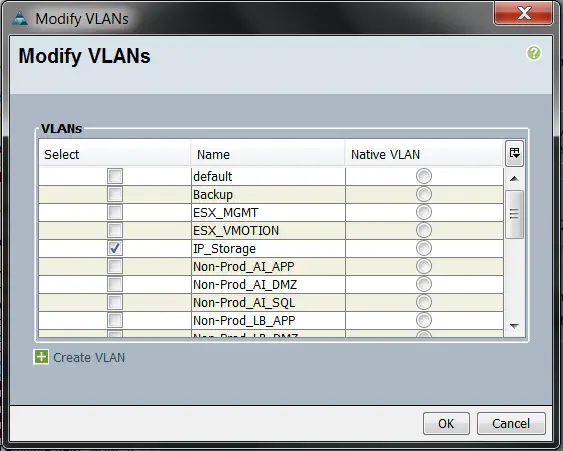Cisco UCS vNIC Switchport Mode
July 23, 2013 in Systems2 minutes
I wrote an article a while back regarding VLAN configuration when running vSphere ESXi on top of Cisco UCS.
A comment pointed out that all vNICs are automatically configured as trunks. I had not heard of this before, so I got into the CLI to take a look.
Here’s a VLAN configuration screen in the UCSM GUI for a sample vNIC:
Check out the running configuration for this vNIC on the underlying NX-OS CLI.
UCS-FI-A(nxos)# show run int veth782
interface Vethernet782
description server 1/7, VNIC BARE-IPST-PROD-A
switchport mode trunk
untagged cos 2
no pinning server sticky
pinning server pinning-failure link-down
no cdp enable
switchport trunk allowed vlan 370
bind interface port-channel1290 channel 782
service-policy type queuing input org-root/org-root/ep-qos-Silver
no shutdown
As you can see, even though we have a single VLAN checked in the GUI, the vNIC is still a VLAN trunk, and simply prunes all other VLANs off of the trunk.
This also means…
UCS-FI-A(nxos)# show int veth782 sw
Name: Vethernet782
Switchport: Enabled
Switchport Monitor: Not enabled
Operational Mode: trunk
Access Mode VLAN: 1 (default)
Trunking Native Mode VLAN: 1 (default)
Trunking VLANs Enabled: 370
Administrative private-vlan primary host-association: none
Administrative private-vlan secondary host-association: none
Administrative private-vlan primary mapping: none
Administrative private-vlan secondary mapping: none
Administrative private-vlan trunk native VLAN: none
Administrative private-vlan trunk encapsulation: dot1q
Administrative private-vlan trunk normal VLANs: none
Administrative private-vlan trunk private VLANs: none
Operational private-vlan: none
Unknown unicast blocked: disabled
Unknown multicast blocked: disabled
the native VLAN for this vNIC is still 1, UNLESS you select one of the radio buttons.
You know….in case you haven’t learned to double-check the underlying configuration when in doubt. Took me a while to learn that lesson.
